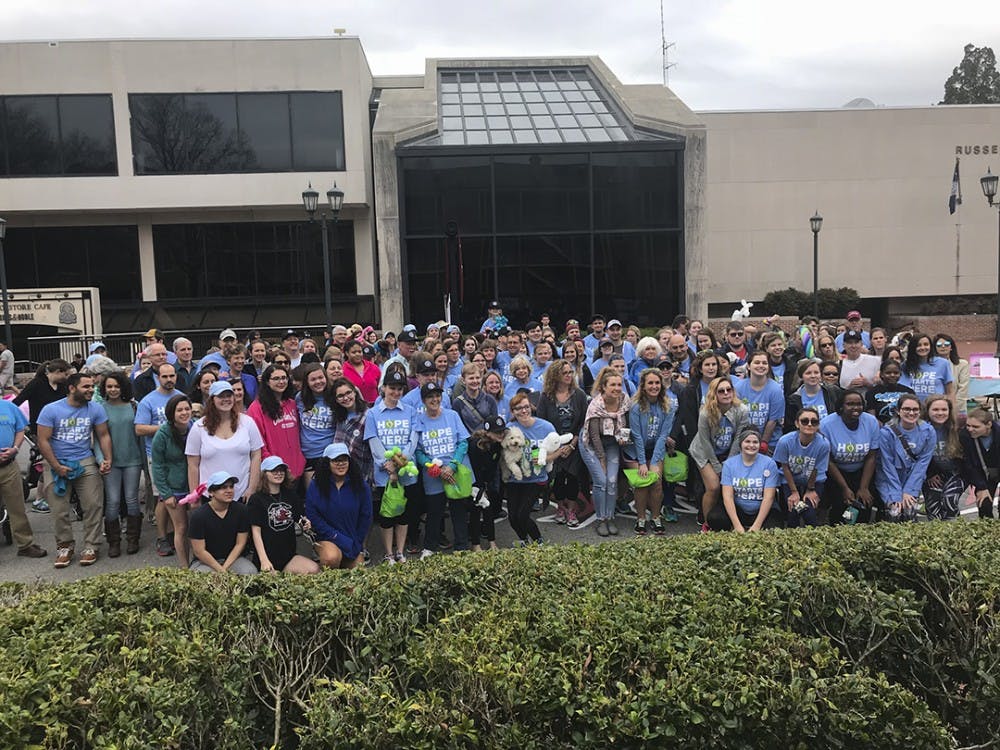Courtney Wilson has struggled with anorexia for 15 years. On Saturday, she walked on the Horseshoe to help raise money for the National Eating Disorders Association.
“I’m specifically walking in memory of one of my friends that passed away nine years ago," Wilson said. "She was the first person I met in treatment ... She unfortunately passed away from suicide.”
A total of 166 people, in addition to their dogs, took part in the walk. Cocky was there, the Carolina Gentleman performed, and there was even a photo booth.
“The walk itself is very upbeat,” said Columbia NEDA Walk Coordinator Karen McMullen.
Eating disorders can hit college students hard as they move to a new city and deal with new stressors and activities, she said.
“I’m very excited to have [the walk] on the USC campus because eating disorders affect a lot of college-aged students,” McMullen said.
According to the Multi-Service Eating Disorders Association, 20 percent of college students said they currently have or previously had an eating disorder. Because of stigmas around eating disorders, it can be difficult to reach out because of the fear of being thought of differently.
“A lot of times eating disorders start as young as 6 years old, but a lot of times they go undiagnosed or because of the stigma that's associated with them, they get overlooked,” McMullen said.
Sponsors for NEDA and the walk were tabling for the duration. Organizations such as Veritas Collaborative, Changing Carolina Peer Leaders and New Hope Counseling and Wellness Center help those struggling with an eating disorder locally. The money donated to NEDA by sponsors goes towards services such as a help hotline, education resources and general support for those affected.
“So many people are either impacted personally or know someone that is impacted by an eating disorder. We need to come together and support,” said New Hope representative Amy Helms.
McMullen spoke about the reason why she personally volunteers with NEDA. Her own daughter was diagnosed with an eating disorder when she was a freshman in high school.
“The reason why I do it is because I want people to walk away knowing that there is hope and that they’re not alone,” McMullen said. “I honestly thought I was the only person in Columbia, South Carolina that had this issue facing me. Little did I know that everyone knows someone with an eating disorder.”
Participants in the NEDA walk were open to sharing their stories of recovery and hope.
“I’ve suffered with an eating disorder for a while and so I think recovery is important and it’s good to spread the word that it’s real,” said second-year education student Franny Masella. "It’s good to know that people know it’s real."
Participants had the option to raise money in teams and as individuals. One individual who did both was second-year public health student Anna Hallman who was part of team Unashamed, that raised $1,690.
“Recovery is important, and everybody needs to know it. It’s hard to do it alone, and from personal experience I know that you can’t do it alone,” Hallman said.
While some participants had personally struggled or were currently struggling with an eating disorder, other participants walked for those they knew. When asked why she walked, participant Linda Bosch said “In honor of our daughter, who had an eating disorder that began ... back in 2002. So it’s something we’ll always do for her.”
These walkers giving messages of hope spoke in support of NEDA and how they had directly made an impact on their lives.
“I think it’s showing that recovery is the most important part and that a support system is the best part,” Hallman said.
McMullen hopes to help other people like her daughter and give them resources. Through her work, the sponsors' efforts and the NEDA as a whole, recovery is possible.
“My purpose is that if I have one person reach out to get help, then I’ve done my job,” McMullen said.

